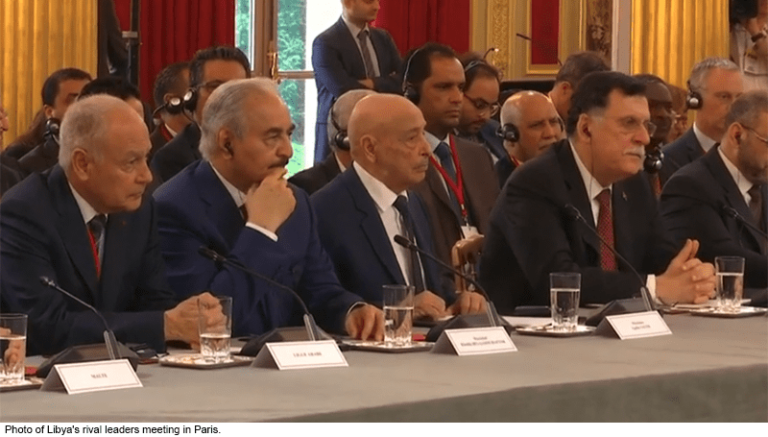
Amid the many conflicts rending the Arab world today, the one in Libya recently took a hopeful turn toward a peace process despite the violence still wracking the cities of Tripoli, Derna, and Sabha. On May 29, Libyan leaders assembled in Paris on the invitation of French President Emmanuel Macron. They agreed to hold parliamentary and presidential elections on December 10, which they hope would begin a long-awaited political journey out of division, instability, and war. While welcome at face value, the accord was only verbal––a sort of a gentlemen’s agreement––and thus allows the parties to renege on their promises: first, to participate in the elections, and second, to accept the election outcomes. It is noteworthy that minor armed actors on the ground were not invited, making their objection to the Paris accord a potentially serious roadblock to its implementation.
Perhaps the most difficult institutional impediment to the agreement in Paris is the absence of a constitutional document that could form a basic law for the country and govern how elections can be held and on what grounds as well as the candidates acceptable to run for office, among other stipulations. United Nations Special Envoy for Libya Ghassan Salamé has recommended passing a draft constitution in a popular referendum to give the whole process necessary legitimacy. Libya’s Constitution Drafting Assembly has also called for such a referendum. Still, however, Salamé is careful not to force the Libyans to accept a plan imposed by outsiders, a fact he emphasized in front of the Paris conference attendees. The current Government of National Accord (GNA) in Tripoli that was created by the UN-supported 2015 Libyan Political Agreement has not been able to assert any constitutional authority. It is also considered to have been the work of non-Libyans cobbling together ad hoc compromises supposedly leading to a resolution of the political stalemate.
To be sure, some Libyans and outside observers are worried about the nature of the new polity and the status of civil-military relations. Without the guarantees that a constitutional arrangement could offer, those who possess military prowess and means may always have the upper hand in the new state. This is more specifically the case with strongman General Khalifa Haftar, who since 2014 has commanded a militia, the so-called Libyan National Army, that now controls almost the entire area of eastern Libya and challenges the Tripoli-based GNA. Those skeptical of Haftar’s ambitions are logically insisting that constitutional mechanisms be put in place so that Muammar Qadhafi’s authoritarianism does not return seven years after the former leader’s demise.
Importantly, Haftar also has the support of powerful external actors like Egypt, the United Arab Emirates, and Russia who have supplied him with arms, treat him like a de facto leader of the country, and recognize his authority over half of Libya. The three countries’ leaders have found his credentials as a fighter of Islamist forces––which the trio have declared an existential foe––as sufficient to give him at least some international legitimacy. Representatives of the three countries were also in attendance in Paris, an attestation to their important role in how things turn out in the country, specifically because of their support for Haftar.
One thing was clear before and during the Paris meeting: Haftar wanted to boost his position on the ground by waging a war on Islamist forces in the eastern city of Derna, with a population of about 120,000. Even Egyptian aircraft participated in bombing the militants’ positions on the pretext of preventing attacks on Egypt. With the east of the country under his sway, the general will likely have a powerful hand to play in the upcoming elections. If his ambition to become Libya’s president is unrealized in December, he could simply refuse to abide by the outcome and may use his military dominance to keep eastern Libya outside the legitimate authority of the government resulting from the parliamentary elections.
While President Macron is right to try to forge a role as peacemaker in Libya and apply some needed international pressure to find an ironclad solution, he would do well to help end the interference of certain regional and international actors in Libyan affairs. For a few years now, Egypt, the United Arab Emirates, and Russia have neglected to support United Nations efforts sufficiently and, instead, threw their lot behind Haftar, an ambitious former army general who promised to fight their war against Islamists in Libya. But Libya is much more complicated than this fight; its future fortunes should depend more on the accord among its different factions than what satisfies foreign powers. An essential first step toward that goal is the quick resumption of discussions about the country’s basic law and its rules and regulations, fundamental elements that govern how the country could meaningfully transform itself into a democratic polity after decades of authoritarianism and civil war.

